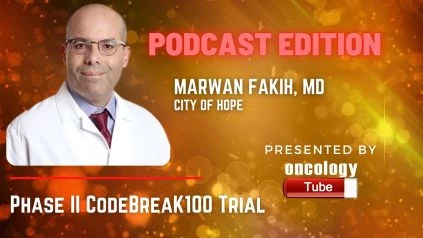Marwan Fakih, MD, The Judy & Bernard Briskin Distinguished Director of Clinical Research; Professor, Department of Medical Oncology & Therapeutics Research; Associate Director for Clinical Research, Comprehensive Cancer Center; Medical Director, Judy & Bernard Briskin Center for Clinical Research; Co-director, Gastrointestinal Cancer Program at City of Hope. Speaks about Sotorasib for previously treated colorectal cancers with KRAS p.G12C mutation (CodeBreaK100): an interim analysis of a single-arm, Phase 2 trial.
Link to Article:
https://www.thelancet.com/journals/lanonc/article/PIIS1470-2045(21)00605-7/fulltext
Backstory:
In the CodeBreaK100 phase 1 trial, sotorasib, a selective, irreversible KRASG12C protein inhibitor, showed monotherapy clinical activity in KRASG12C-mutated solid tumors, including colorectal cancer. In phase 2 of the trial, we wanted to look into the activity and safety of sotorasib.
Methodologies:
Adult patients with KRASG12C-mutated advanced solid tumors who were 18 years or older, had at least one measurable lesion according to the Response Evaluation Criteria in Solid Tumors (RECIST) version 1.1, and had an Eastern Cooperative Oncology Group performance status of 1 or lower were enrolled in this single-arm, phase 2 trial from 59 medical centers in 11 countries. This basket trial only presents data from individuals with colorectal cancer who were enrolled at 33 medical centers in nine countries. Patients required to have progressed after undergoing fluoropyrimidine, oxaliplatin, and irinotecan treatment in order to be included in the study. These patients were given 960 mg sotorasib orally once a day until their disease progressed, they had unacceptable adverse effects, they withdrew their consent, or they died. The primary outcome was objective response (complete or partial), which was judged by a blinded independent central review. Patients who received at least one dosage of sotorasib and had at least one detectable lesion at baseline were examined for response; patients who received at least one dose of sotorasib were evaluated for safety. The phase 2 colorectal cancer cohort generated this investigation, which was pre-planned. This study is active but no longer recruiting, according to ClinicalTrials.gov (NCT03600883).
Conclusions:
At the data cutoff on March 1, 2021, 62 patients with KRASG12C-mutant colorectal cancer who had received at least one dose of sotorasib monotherapy had been enrolled between August 14, 2019 and May 21, 2020. Six of the 62 patients (97%, 95 percent CI 36%–199) had an objective response, all of whom had a partial response. Six (10%) patients had treatment-related adverse events of grade 3, the most prevalent of which was diarrhoea (two [3%] of 62 patients), and one (2%) patient had treatment-related adverse events of grade 4 (blood creatine phosphokinase rise); no fatal occurrences were reported. Two participants (3%) experienced serious treatment-related side effects (back pain and acute kidney injury).
Observation:
Although the overall response rate of 97% did not meet the target, oral treatment of sotorasib once daily in these extensively pretreated chemorefractory patients exhibited modest anti-tumour effectiveness and tolerable safety. To boost potential activity and overcome potential resistance mechanisms, sotorasib is being tested in combination with other treatments.

